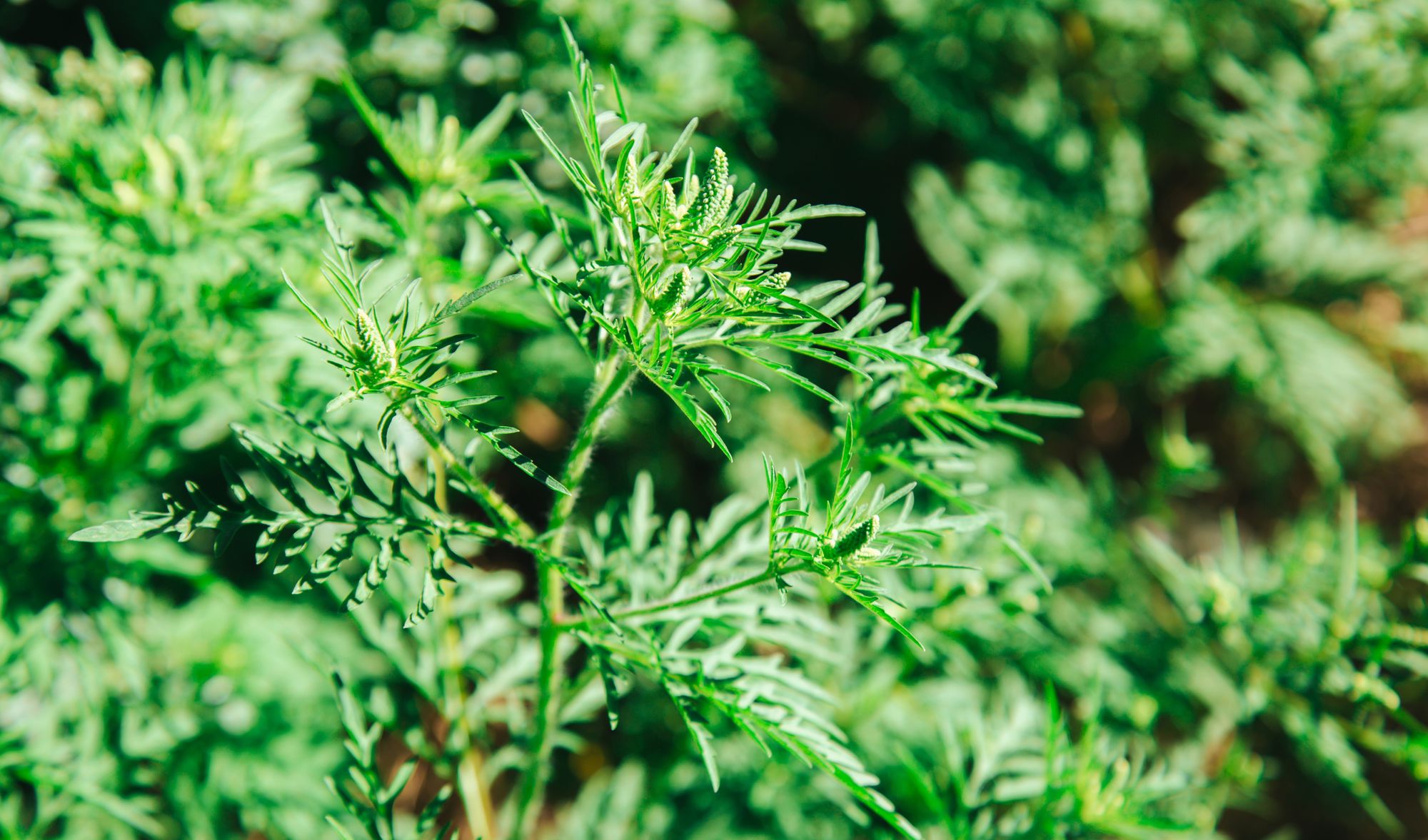What You Need to Know About Ragweed Allergy Season This Year
Ragweed allergies can make us feel completely miserable. This guide will help you get prepared for ragweed season before it even comes around.

What Are Ragweed Allergies?
If you have experienced allergies you know not only how distracting they can be, but also how they can make you feel like the whole world (especially nature!) is plotting against you.
Hay fever, or allergic rhinitis is the irritation of your immune system because it mistakes a benign allergen, like pollen from ragweed, to be harmful.1 Symptoms of hay fever can include a runny nose, itchy eyes, congestion, sneezing and sinus pressure.1
There are many different types of allergens that can cause allergies; one of the most common is ragweed. Ragweed is a seemingly innocent plant with green flowers2 which contains lots of pollen that is released into the air and can cause you to suffer allergies.
Ragweed allergies come later in the year but are getting more intense every year
With over 17 different types of ragweed in North America, and the sensitivity to this allergen only increasing, it’s no question why ragweed allergies are such a big problem.3 Ragweed season typically occurs later in the year, with a duration from late August to October.3

Why Are My Allergies Getting Worse?
Even though allergy season occurs later in the year, you may have noticed that your ragweed allergies are acting up earlier in the year and seem more intense. There is actually a reason for this! One study tracked pollen trends from 1990 to 2018 and found that climate change was a significant factor leading to the 21% higher pollen concentration and a 20 day longer pollen season length.4
COVID might have helped mitigate allergy symptoms last year but allergy season is still getting more severe
Despite the 30-year trend that points towards worse allergy seasons, however, the allergy season in 2020 was actually quite mild in comparison. Some scientists believe that the COVID-19 restrictions that have been in place for the past year (e.g. wearing face masks and staying indoors whenever possible) have mitigated the exposure to pollen and helped relieve allergy symptoms.5 Some even believe that the year inside may have made some people more sensitive to allergens this year.6 However, this information is quite speculative and requires more research.
How to Beat Allergy Season
Unfortunately, there is no cure to ragweed allergies yet. Because pollen is so widespread and important to crop production, it’s not possible to avoid getting hay fever from ragweed pollen and the best that we are able to do is treat the symptoms that result from the condition.1
The most common solution for surviving any allergy season is to take over the counter medication (e.g. Allegra, Claratin, Reactin, etc.) to treat the symptoms that allergies cause.1 Other alternatives include nasal sprays (e.g. Nasonex, Flonase Allergy Relief, etc.) and decongestants (e.g. Afrin).1
Pro Tip: Take nasal steroid sprays a month before you expect allergy symptoms
Dr. Ahmad Sedaghat, an ear, nose, and throat specialist, also suggests that you can take certain allergy medications, specifically nasal steroid sprays, up to a month before allergy season.7 He explains that this is because nasal steroid sprays can take up to a month to affect your cells to properly combat allergy symptoms.7
One way to lessen your risks of becoming irritated by ragweed is to stay updated on when ragweed counts high and avoid going out on these days. Dry, windy days are especially bad but rainy days clear the pollen from the air, making it a better option to go outside.8

If your symptoms are severe and unaided by over-the-counter medication, you can also talk to your doctor about an allergy vaccine.8 The idea behind allergen immunotherapy is that you take regular injections of ragweed and, over time, you become desensitized to it.8 Allergy vaccines are specific to certain allergens, so over time your immune system will attack ragweed less and less, making your symptoms less severe.3
Both traditional and alternative medicinal treatments are being researched to mitigate allergy symptoms
There are also interesting treatments for allergies that are being discovered everyday! A 2013 study found that people who suffered from seasonal allergies found temporary relief after acupuncture therapy compared to those who did not.9 The researchers noted that the relief was modest and may have been because of the mindset of the volunteers.9 However, researchers believe that of alternative treatments for allergies, acupuncture is the one that holds the most promise.10
Because allergies can truly affect people’s quality of life so significantly, researchers are still trying to find new ways that they can lessen the effect of allergens in the hope that they can create better solutions for specific allergens, like ragweed. Consider contributing your time to these studies to help researchers fight ragweed allergies!
Allergy studies are currently closed. Thank you for contributing your time & please check below to discover more studies!
Honeybee
Connects the community with research. Honeybee is a web and mobile app to participate in research, discover yourself, and earn cash and rewards.
References
1. Hay fever - Symptoms and causes. Mayo Clinic. Accessed June 23, 2021. https://www.mayoclinic.org/diseases-conditions/hay-fever/symptoms-causes/syc-20373039
2. ragweed noun - Definition, pictures, pronunciation and usage notes | Oxford Advanced Learner’s Dictionary at OxfordLearnersDictionaries.com. Accessed June 23, 2021. https://www.oxfordlearnersdictionaries.com/us/definition/english/ragweed?q=ragweed
3. El-Qutob D. Vaccine development and new attempts of treatment for ragweed allergy. Ther Adv Vaccines. 2015;3(2):41-47. doi:10.1177/2051013614565354
4. Anderegg WRL, Abatzoglou JT, Anderegg LDL, Bielory L, Kinney PL, Ziska L. Anthropogenic climate change is worsening North American pollen seasons. Proc Natl Acad Sci. 2021;118(7). doi:10.1073/pnas.2013284118
5. Allergy Season Is Longer and Stronger This Year. Healthline. Published April 26, 2021. Accessed June 23, 2021. https://www.healthline.com/health-news/why-allergy-season-is-longer-and-stronger-this-year
6. 2021 Allergy Forecast: A Bad Year for Everyone? MPCP. Published April 1, 2021. Accessed June 23, 2021. https://www.mpcp.com/articles/preventative-care/2021-allergy-forecast-a-bad-year-for-everyone/
7. The secret to an easier allergy season. Harvard Health. Published January 13, 2017. Accessed June 23, 2021. https://www.health.harvard.edu/allergies/the-secret-to-an-easier-allergy-season
8. Seasonal allergies: Nip them in the bud. Mayo Clinic. Accessed June 23, 2021. https://www.mayoclinic.org/diseases-conditions/hay-fever/in-depth/seasonal-allergies/art-20048343
9. The Effects of Acupuncture on Seasonal Allergic Rhinitis. Ann Intern Med. 2013;158(4):I-40. doi:10.7326/0003-4819-158-4-201302190-00001
10. Hoyte FCL, Nelson HS. Recent advances in allergic rhinitis. F1000Research. 2018;7:F1000 Faculty Rev-1333. doi:10.12688/f1000research.15367.1

